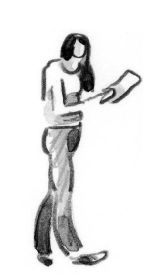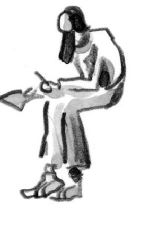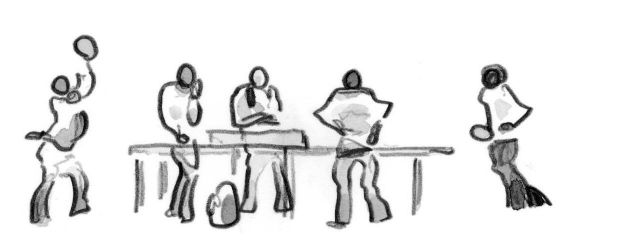Ridiculous/Hilarious/Terrible/Cool (9 page)
Read Ridiculous/Hilarious/Terrible/Cool Online
Authors: Elisha Cooper

Emily says her favorite player is Ronaldo, the Brazilian striker. But she plays more like his countryman Ronaldhino. They have the same midfield position, the same creative playmaking, the same goldish cleats, the same serious face that breaks into a flashy smile. With her cocoa skin and black ponytail she looks like she could be Ronaldhino's kid sister.
But unlike Ronaldhino, Emily rarely takes her own shot.
After school, Maya Boudreau's all-female cast shows up in the third-floor rehearsal room. They're yawning. Maya stares at them and says, “Why don't you take a lap around the school? You're
really
low energy!”
really
low energy!”
The girls stare at her.
“No.
Really,
” she replies. “Let's do it!”
Really,
” she replies. “Let's do it!”
Maya leads the girls through the hallways in a gangly jog. They come back panting, and start blocking the play. Maya sits in her director's chair, rolling her right foot.
The role of director comes easily to her. She chews her pencil, occasionally taking it out of her mouth to make notes in the script.
The actors are having some difficulty, and making complaints:
“I don't know the next line!”
“I don't know how to stand!”
“I don't know where to put my arms!”
“I don't know how to hold a baby!”
Maya meets each worry with a calm response:
“Okay, read your script.”
“Well, maybe move around.”

“At your sides is fine.”
“Imagine the baby is a puppy and you're talking to it.”
For all their complaining, the girls clearly look up to Maya. In another era, Maya is the type of girl who would teach younger girls how to bake a pie. Here she is teaching them how to act.
And the girls, if unintentionally, are teaching Maya. Making her translate all the advice she's been given over her years of acting, making her explain things she just
knows
. It's a challenge. She has a definite idea of where she wants the play to go, but how do you ask another person to give you something they don't know how to give?
knows
. It's a challenge. She has a definite idea of where she wants the play to go, but how do you ask another person to give you something they don't know how to give?

Down the hall from Maya's rehearsal, a meeting of
Paw Prints
has just begun. The newspaper's room is a mess of monitors and printers. On one wall is a white board with a drawing of a chicken.
Paw Prints
has just begun. The newspaper's room is a mess of monitors and printers. On one wall is a white board with a drawing of a chicken.
As the faculty advisor peppers the students with questions about their articles, they stutter in response. The staff is mostly male. Most have unmanaged hair, brown corduroys, pale skin. The few girls of
Paw Prints
are better groomed and more assertive, possibly because here they have found boys over whom they can assert themselves.
Paw Prints
are better groomed and more assertive, possibly because here they have found boys over whom they can assert themselves.
Two
Paw Prints
boys are not like the others. They're the two shaggy-haired boys from Maya's English class. The larger one is named Ben. The smaller one is named Andy. Their shaggy hair does not hide their good looks. If anything, it adds to it. As the rest of the
Paw Prints
staff hunches at their computers, Ben and Andy straddle chairs and throw ideas back and forth at each other, casually jawing. They're seniors, best of friends. They hang out with each other so much that classmates often refer to them by one name: Ben&Andy.
Paw Prints
boys are not like the others. They're the two shaggy-haired boys from Maya's English class. The larger one is named Ben. The smaller one is named Andy. Their shaggy hair does not hide their good looks. If anything, it adds to it. As the rest of the
Paw Prints
staff hunches at their computers, Ben and Andy straddle chairs and throw ideas back and forth at each other, casually jawing. They're seniors, best of friends. They hang out with each other so much that classmates often refer to them by one name: Ben&Andy.
On the wall behind Ben&Andy is a poster with this quotation: “A writer is a person for whom writing is more difficult than it is for other people,” words of advice that don't seem to apply to them.
Diana Martinez got a job. A friend's mother runs a day-care center and Diana started working there after school. The swim team's season just finished, and the time Diana used to spend in the pool is now spent taking care of toddlers. The job doesn't fit her. She doesn't like taking care of other people, especially little people. All the crying, all the aggravation of trying to get them to sleep, the
routine.
It's making Diana ill. She's already been home sick four days this month and is falling behind in her classes. She finds she's more tired than when she was swimming, with little energy for homework. And there are things going on at home that she doesn't want to talk about.
routine.
It's making Diana ill. She's already been home sick four days this month and is falling behind in her classes. She finds she's more tired than when she was swimming, with little energy for homework. And there are things going on at home that she doesn't want to talk about.
Diana looks across the atrium.
Every day this fall, recruiters from colleges as varied as Michigan and MIT have been setting up tables in the atrium to sell their schools. Today's recruiters are from the U.S. Marine Corps. Two Latino boys in crisp khaki shirts and ironed blue pants. They look smaller than the students they're recruiting. They stand, backs straight, trying to hand out free stuff to students who walk past. The students ignore them and gather around the Ping-Pong tables, the
pock-pock-pock
of the games as constant as a ticking clock.
pock-pock-pock
of the games as constant as a ticking clock.
Diana has been thinking about where she will apply to college. She's looking mostly at Midwestern schools: Iowa, Illinois, Loyola, the University of Illinois at Chicago, DePaul. Colleges that are close to home, but not too close.
She misses swim practice. She misses those fifty laps she had to herself. With her new job, Diana swims only one day a week now, during her Thursday seminar. She would try to swim more, but her best friend Sandra swims with her, and Sandra complains that the chlorine does bad things to her hair. So Diana, to be a good friend, doesn't swim as much.
A slim boy walks through the halls, right arm around a girl. The girl is wearing a huge winter coat, her hooded head buried in the boy's shoulder, her arm slack against his chest. But she has no legs. It takes a moment, as they approach, to see that there is no girl, no
they,
only the coat itself. Winter has come to Chicago.
they,
only the coat itself. Winter has come to Chicago.
Aisha has never owned a winter coat. There was never any reason to. Cairo winters and Chicago winters are a little different. So last weekend the Shaikhs drove to the malls outside the city. Aisha bought a long coat with buttons and a shorter jacket with pretty embroidery. She and her middle sister also loaded up on stockings and sweaters. They'll share. They share everything.
The four females in the Shaikh family all have the same-size feet. This exponentially expands Aisha's shoe options. She can wear her mother's dress shoes when she wants, or her sisters' Pumas when she doesn't want to wear her own Pumas, because she loves Pumas and would wear Pumas all the time if she could. Aisha is a little obsessed with Pumas. The only problem with sharing shoes is that her littlest sister doesn't wear socks and, Aisha groans, “She has stinky feet!”
Aisha's Pumas are off now, her stockinged legs folded beneath her in her library carrel. Sitting next to her are a couple of girls from Aisha's art class. They're doing their homework together, occasionally glancing up from their books to ask each other questions. Aisha has become friendly with these girls. It's been nice, but she knows there's a difference between friend
ly
and friend
ship
. These are not people she hangs out with after school.
ly
and friend
ship
. These are not people she hangs out with after school.
Aisha mostly hangs out with her sisters. Over the weekend she went downtown with her middle sister in their new jackets. Their father dropped them off. After looking at the Christmas lights and getting hot chocolate at Marshall Field's, they realized they didn't have enough money for the "L” ride home. Aisha called her father and he picked them up. He wasn't mad. He's protective. And, Aisha says, she's his favorite.
Her father is strict, but Aisha knows how to deal with him (the middle sister clashes with him more).
What he says, goes
doesn't necessarily mean that what he says can't be selectively heard. And, he has a sense of humor. There's only one thing he doesn't have a sense of humor about: The girls are not allowed to date until they leave home.
What he says, goes
doesn't necessarily mean that what he says can't be selectively heard. And, he has a sense of humor. There's only one thing he doesn't have a sense of humor about: The girls are not allowed to date until they leave home.
“If he knew, he'd go crazy!” Aisha says, eyes widening to indicate that she
has
dated and that her father never found out. She doesn't say whether she would take that risk again. No boys at Payton interest her anyway. She looks across the library at some underclassmen horsing around a table.
has
dated and that her father never found out. She doesn't say whether she would take that risk again. No boys at Payton interest her anyway. She looks across the library at some underclassmen horsing around a table.
“The boys here are timid, they don't talk a lot. And the ones who
do
talk, don't stop talking.”
do
talk, don't stop talking.”
She laughs, looks again.
“It's a lot of effort to make friends, and to have a boyfriend I'd have to be friends with them before . . .” She trails off. “I'll probably just wait until college.”
Zef Calaveras had quite a weekend. Friday night he got a girlfriend, Saturday morning he got a mixing board, Saturday night he got tested for insomnia, Sunday night he didn't fall asleep until four (which would make that Monday morning), and he slept through his alarm and was late to school, again.
Now he's slumping under the stairs in his black pirate T-shirt, draining his six shot, half-decaf, no water, iced venti Americano.
Working backward, starting with Saturday. Because Zef's sleeplessness had been getting worse, his mother took him to a sleep study center. He was hooked to electrodes, a wire contraption was shoved up his nose, then he was left in an unpleasant room (someone nearby was working a jackhammer) and told to sleep. For eight hours Zef lay there wide-awake.
“It was so
ridiculous!
”
ridiculous!
”
The sleep doctor was exasperated.
“The guy was really
strange
. Though if you had to sit up all Saturday night watching people sleep,
you'd
be sort of strange too.”
strange
. Though if you had to sit up all Saturday night watching people sleep,
you'd
be sort of strange too.”

The upshot is that Zef was pulled from the sleep study program and is hoping a sedative will help him get to sleep, and to school on time.
The new mixing board may not help. Zef's mother is a Buddhist so on Saturday, to celebrate Bodhi Day, she gave him a mixing board. Zef lives with his mother (his parents are in the process of divorcing), in a beige brick two-story on the city's West Side, a block away from Western Avenue and its many blinking used-car dealerships. Since Zef's room is a mess, he may keep the mixing board elsewhere in the house. He dreams about turning a room in the house into a studio. The mixing board has all these cool features he can describe in detail andâ
“What up,
Sumner!
”
Sumner!
”
“Hey, did you do the bio?”
“
What
bio?
Shit
. What was I saying?”
What
bio?
Shit
. What was I saying?”
Zef continues describing the mixing board, and the girlfriend. She's cute. She goes to Payton. She's a sophomore. They started hanging out last year in phys ed, then after school in the parking lot, then at her apartment. They were just friends, though he always thought she was sweet. Friday evening they were instant-messaging and that's when they agreed to go out.
So, all things considered, an excellent weekend, whose excellence cannot completely cover over the fact that Zef is getting D's in his classes. He yawns and sips his coffee.
“Have I mentioned that I hate precal?”

Other books
Carl Weber's Kingpins by Smooth Silk
Shadow Walkers by Kostura, Micheal
Death Sentence by Sheryl Browne
Gentle Control by Brynn Paulin
The Grail Tree by Jonathan Gash
A Silent Fury by Lynette Eason
Watch Your Back by Rose, Karen
A Shrouded World (Book 2): Atlantis by Tufo, Mark, O'Brien, John
Fain the Sorcerer by Steve Aylett
Asunder (Iron Bulls MC #1) by Phoenyx Slaughter